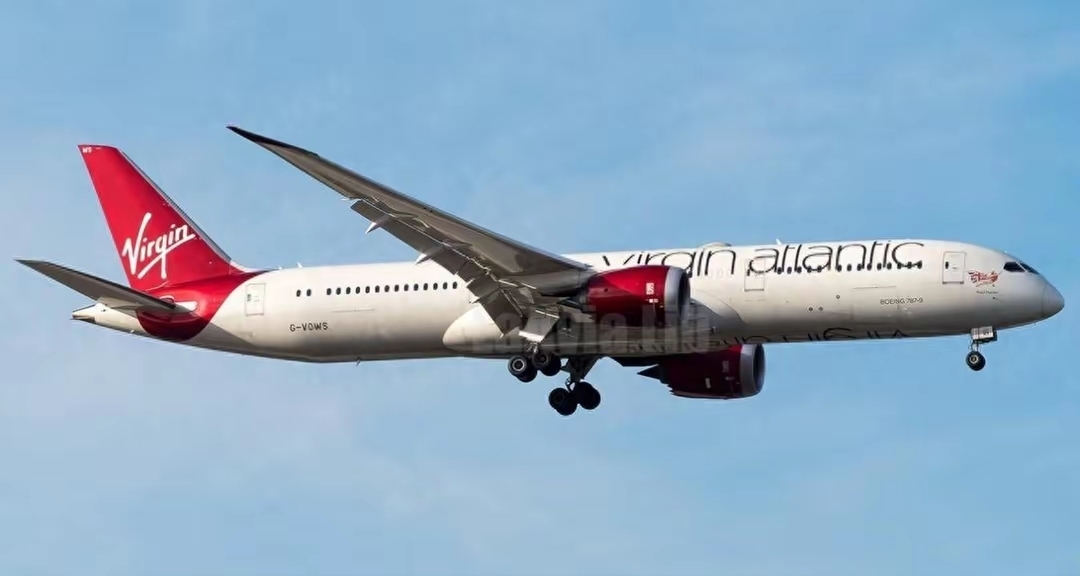
On the evening of July 17th, Virgin Atlantic officially confirmed the suspension of its Shanghai London round-trip route. This route is currently the only passenger route operated by Virgin Atlantic in the Chinese market, and it has been 25 years since its maiden flight in 1999.
After the outbreak of the epidemic, this route was suspended for 859 days and was only announced to resume on May 1st last year. Virgin Atlantic announced that the last flight from London to Shanghai will operate on October 25, 2024, and return to London from Shanghai on October 26. Passengers who book flights after October 26th will receive a full refund.
Regarding the reasons behind the grounding, Virgin Atlantic's announcement explains that the Shanghai London route requires detours around Russian airspace, resulting in longer flight times and increased fuel costs. Additionally, it requires the deployment of four captains, which further increases flight costs. These factors significantly increase the expenses for route operations.
In addition, the significant challenges and complexity of this route have also led to the commercial decision to suspend flights to Shanghai, with detours increasing flights from London to Shanghai by about 1 hour and return flights by about 2 hours. This not only increases fuel costs, but also squeezes the weight of passengers or cargo that the aircraft can carry, compressing profit margins. From the perspective of market demand, the business customer base of this route is not ideal, with reduced revenue and increased costs. Therefore, the airline's decision to close this route is a normal business decision.
The withdrawal of Virgin Atlantic may have a certain impact on personnel and economic exchanges between China and the UK. For those who rely on this route for business activities, tourism, or study abroad, they may need to look for alternative routes, which may increase travel costs and inconvenience. Meanwhile, the suspension of this route may also have a certain impact on Shanghai's air transportation market, reducing market competition.
From a global economic perspective, this event also reflects some broader economic impacts. Since the outbreak of the conflict between Russia-Ukraine conflict, Russia and Europe, the United States and other countries have exchanged airspace, which has impacted international air transport. The impact on the Asia Europe routes operated by European airlines has been particularly severe, with operating costs rising. This is not only reflected in the increase of fuel costs, but also involves issues such as extended flight time and limited cargo capacity caused by detours, which affect the efficiency and cost of related trade and economic activities.
In the China Europe air route market, the competitive landscape has undergone significant changes. Chinese airlines' competitive advantage on the China Europe route has become increasingly prominent due to their exemption from the ban on entering Russian airspace. According to data from the first half of 2024, domestic airlines accounted for 72.2% of European routes, while foreign airlines only accounted for 27.8%. This change may prompt more foreign airlines to adjust their route layouts and market strategies.
In addition, the instability and uncertainty factors of the global economy are also increasing. For example, the geopolitical situation has disrupted the global supply chain, causing prices of commodities such as energy, food, and industrial metals to soar, further exacerbating inflationary pressures. As an important component of the global economy, the rising operating costs of the aviation industry may be transmitted to other related industries, causing a certain chain reaction on the global economy.
However, the aviation market is constantly changing. In the future, there may be other airlines entering this market to fill the gap left by Virgin Atlantic. Meanwhile, with the gradual easing of the global pandemic and the recovery of the aviation market, as well as changes in the international situation, Virgin Atlantic may also reconsider resuming operations on this route.
For consumers, when choosing airlines and routes, in addition to considering factors such as price and convenience, they should also pay attention to the reputation and service quality of the airline, which is more important for passengers' experience and economic conditions. For airlines and related industries, it is necessary to closely monitor market trends and global economic conditions, flexibly adjust strategies to cope with various challenges and changes.

Since 2025, the conflict between the United States and Europe over the governance of the digital economy has continued to escalate.
Since 2025, the conflict between the United States and Euro…
When German Chancellor Mertz officially announced that he w…
On December 3rd local time, the copper price on the London …
The European Commission announced a new economic security s…
The European Commission announced a new economic security s…
For nearly a year, US President Donald Trump has launched a…